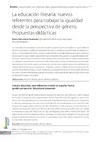Please use this identifier to cite or link to this item:
https://accedacris.ulpgc.es/jspui/handle/10553/73549
| Title: | La educación literaria: nuevos referentes para trabajar la igualdad desde la perspectiva de género. Propuestas didácticas | Other Titles: | Literary education: new references to work on equality from a gender perspective. Educational proposals | Authors: | Hernández Quintana, Blanca Ángeles | UNESCO Clasification: | 5801 Teoría y métodos educativos 6202 Teoría, análisis y crítica literarias |
Keywords: | Educación literaria | Issue Date: | 2020 | Publisher: | Sociedad Española de Didáctica de la Lengua y la Literatura | Journal: | Lenguaje Y Textos | Abstract: | Las investigaciones derivadas de los estudios de género proponen, entre otros objetivos, nuevos referentes desde los que ampliar y modificar la representación social y cultural que ha conformado el imaginario colectivo. La crítica literaria feminista y la teoría queer rescatan voces silenciadas por el sistema patriarcal y deconstruyen los textos literarios para ofrecer nuevas interpretaciones que den voz a pluridentidades alternativas al orden normativo. Del mismo modo, sugieren obras con las que ofrecer modelos de identificación que abarquen una dimensión social lo más amplia y real posible. La educación literaria tiene la responsabilidad de educar a lectores/as capaces de interactuar con la obra, pero también capaces de contemplar otros modelos identitarios en los que reconocerse o considerar y respetar. El objetivo de este artículo es profundizar en la necesidad de utilizar en el aula mecanismos y estrategias literarias que forman parte del proceso de construcción de la identidad para trabajar la igualdad, y ofrecer propuestas didácticas para el alumnado de Educación Primaria y Secundaria. Research derived from gender studies proposes, among other objectives, new references in order to expand and modify the social and cultural representation that has forged the collective imagination. Feminist literary criticism and queer theory rescue voices silenced by the patriarchal system and deconstruct literary texts to offer new interpretations that give a voice to pluridentities that are alternatives to the normative order. Likewise, they suggest literary work that can offer identification models and cover a social dimension as wide and real as possible. Literary education has the responsibility of educating readers which are capable of interacting not only with literay work, but also contemplating other identity models with respect. The objective of this article is to deepen the need to use literary mechanisms and strategies in the classroom that are part of the process of identity construction to work equality, and to offer didactic proposals for Primary and Secondary Education students. |
URI: | https://accedacris.ulpgc.es/handle/10553/73549 | ISSN: | 1133-4770 | DOI: | 10.4995/lyt.2020.11555 | Source: | Lenguaje y textos [ISSN 1133-4770], n. 51, p. 95-106 | URL: | http://dialnet.unirioja.es/servlet/articulo?codigo=7472967 |
| Appears in Collections: | Artículos |
Page view(s) 1
166
checked on Jan 10, 2026
Download(s)
58
checked on Jan 10, 2026
Google ScholarTM
Check
Altmetric
Share
Export metadata
Items in accedaCRIS are protected by copyright, with all rights reserved, unless otherwise indicated.
